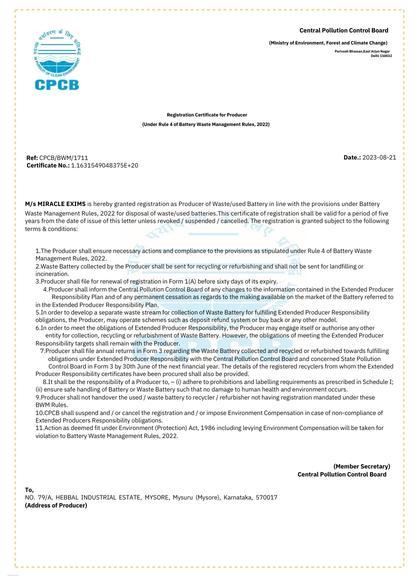Apply EPR License in 1 day and get your Custom Clearance
- Consulted 400 + EPR Registrations
- Free Experts Assistance
- Minimum Price guaranteed
- Quick and Hassle-Free Process
- Free Consultation on Import-Export Compliance
- 20 years experience & Serving more than 1100+ companies
- Providing one stop solution for all Annual compliances
CONTACT US
Our advisor is just a call away
What is EPR Registration for Import in Haryana ?
Extended Producer Responsibility (EPR) Certification is a new and emerging framework for enhancing environmental sustainability through a producer’s extended responsibility for the whole lifecycle of their products. The certification makes sure that businesses calculate for the waste their goods create, from production and through post-consumer disposal.
Due to high environmental impact, EPR Certification often required Industries (like plastics, electronics, and packaging) This certification pushes companies to build systems for collecting waste, recycling and disposing of waste. Offering products in a sustainable way encourage recycling, thus mitigating pollutions and saving companies resources.
To obtain EPR Certification, manufacturers must formulate a waste management plan, coordinate with authorized recycling agencies, and comply with strict environmental regulations. Regular compliance reporting is essential to ensure that businesses remain accountable and transparent.
There are many benefits of EPR Certification for the businesses. It reinforces regulatory adherence, strengthens brand reputation, and signals a commitment to sustainability. Environment-wise, it brings down waste to landfills, encourages resource recycling, and minimises pollution.
The EPR certification is a milestone in global sustainability,” EPR is a win-win for businesses and the environment, as it encourages businesses to not only meet legal responsibilities but also work towards a more sustainable future. This is in-line with the expectations of eco-minded consumers and regulators, and demonstrates a company’s commitment to doing good on the planet.
Process of EPR Certification for Import in Haryana ?
The registration under EPR is critical for businesses that manage waste. Information and documents of the waste are obtained, which include company name, GST certificate, and then submitted to the CPCB portal. The application is assessed by the CPCB, which may require more details. Once approved, the EPR certificate is issued to the individual, conveying their adherence to environmental standards.
What are the documents needed for EPR for Import in Haryana ?
Documents required for Business EPR Registration in India are company incorporation proof, PAN card, GST certificate, product details, if you are dealing with Import/Export, IEC, waste management strategy, turnover of business proof, PRO agreement, etc. This is necessary because it is essential to ensure that it is complete and accurate
Regulatory Compliance of EPR Certifications
Extended Producer Responsibility (EPR) certifications play a key role for organizations as they seek to maintain sustainable environmental best practices. EPR compliance encompasses various obligations for producers, mandating responsible management of the entire lifecycle of their products and focusing on waste reduction and recyclability.
Businesses need to be aware of which specific regulations apply to their industry and geography in order to be EPR compliant. This involves knowing which products fall under EPR requirements, what the reporting standards are, and what recycling or take-back programs are already in place. Compliance, thereby, includes accurate documentation and transparent reporting which reflects positively through a company’s commitment towards environmental sustainability.
One of the most important aspects of EPR compliance is product design. They’re encouraged to design products that can be more easily recycled, use fewer toxic ingredients and last longer. This not only enables compliance but also encourages innovation and efficiency in product development (which can save money and increase product attractiveness).
Waste Management Systems A third important aspect of EPR compliance is implementing effective waste management systems. To avoid dumping their used goods, companies need to implement solid take-back systems or work with certified recyclers. This can mean establishing collection centers, incentivizing customers to return products, and ensuring recycled materials are processed following regulatory guidelines.
Maintaining compliance requires regular assessments and audits. Such assessments survey areas for improvement and ensure that EPR requirements are met across the board. You can also consider investing in compliance management software that can take care of these processes and systematize tracking of the progress, documentation to be handled, and audit reports that need to be generated.
It is also necessary to train and educate employees about EPR regulations and sustainability practices. They will hence cultivate an organizational culture of environmental compliance as a well-informed workforce is better able to implement relevant strategies.
Failure to adhere to these rules can lead to heavy sanctions, litigation, and reputational harm. Hence, EPR compliance should be a top priority, given that it is a legal requirement, as well as a strategic business move that improves sustainability and operational efficiency.
All in all, conformity to EPR certification is not a type of strange legislation, however a whole healthy and balanced procedure of consumer proficiency that enforces and also motivates its owners to go greener with their services, making them product-focused. EPR encourages companies to adopt sustainable practices that benefit the planet, and these practices can also lead to long-term financial and reputational gains for businesses.
Reach US at:
Contact the Global Solution team at +91 9999253054 or send an email to support2@globalsolution.co.in to discuss the unique requirements for your company. It takes 20 to 25 minutes to discuss needs. Once you’ve discussed the situation with our devoted team, we’ll help you. They will offer answers and all the help you require.
STEP 2- Submission of Required Documents
During EPR Registration for battery waste management, our staff will ask you for the information and supporting paperwork needed.
STEP 3- Payment Process
The government fees can be paid via the site after the required paperwork has been sent; we will provide you more information on the payment process.
STEP 4- Realtime Progress Updates
Our staff allows you to follow the status of your application in real time throughout the registration process.Transparency is ensured by this function, which also keeps you updated on jobs that have been finished and those that are still in process.
STEP 5: Issuing Certificates
After our staff has examined the paperwork, the application is sent to the CPCB, who will examine it and give the necessary certifications. As soon as the procedure is finished, your registration and accreditation will be sent to the email address you supplied.
To satisfy your company’s demands, Global Solution provides efficient and effective solutions. Please do not hesitate to get in touch with us if you want any more assistance or clarification. We’ll be happy to help you with the authorization requirements.
Sample of a EPR Grant Certificate






















